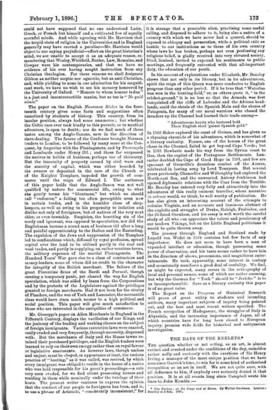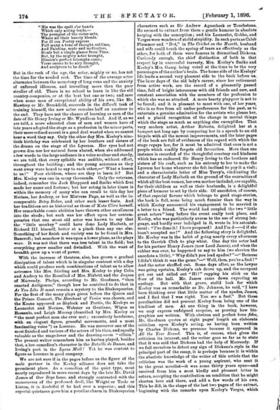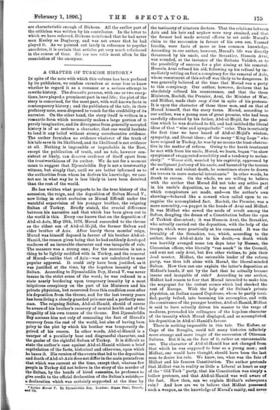THE DAYS OF THE KEELEYS.*
THE question whether or not acting, as an art, is almost extinct and crushed under the conditions of the day, coincides rather sadly and curiously with the exertions of Sir Henry Irving, a manager of the most unique pcsition that we have seen since Garrick's time, to win for it some kind of authorised recognition as an art in itself. We are not quite sure, with all deference to him, if anybody ever seriously denied it that position. It is at all events long since Campbell wrote his lines to John Kemble
• Th. Ireeleys: on O. Stage and at Rom. By Walter Goodman. London t Bentley aid Bon. 189F.,
His was the spell o'er hearts Which only acting lends,— The youngest of the sister-arts, Where all their beauty blends. For ill can Poetry express
Full many a tone of thought sublime, And Painting, mute and inotionless, Steals but a single glance from Time. But, by the mighty actor brought, Illusion's perfect triumphs come; Verse ceases to ba airy thought, And sculpture to be dumb."
But in the rush of the age, the actor, mighty or no, has not the time for the needed rest. The time of the average actor alternates between the monotony of long runs and the anxiety of enforced idleness, and travelling more than the poor stroller of old. There is no school to learn in like the old country-companies, or at the best but one or two; and save when some man of exceptional ability of his own, like Mr.
Hawtrey or Mr. Brookfield, succeeds in the difficult task of training himself, the new actor remains half an amateur to the end. They have not the chance of learning as men of the date of Sir Henry Irving or Mr. Wyndham had. And if, as we are told, a more educated class of men and women have of late years adopted the stage as a profession in the minor parts, their more refined accent is a good deal wasted when we cannot hear a word they say. Only the. other day Mrs. Keeley's nine- tieth birthday was celebrated by her brothers and sisters of the drama on the stage of the Lyceum. Her eyes had not grown dim nor her natural force abated, when slse addressed a few words to the large audience in a voice so clear and steady, we are told, that every syllable was audible, without effort, throughout the building ; and the young actresses as they went away were heard to say to each other,—" What a lesson to us !" Poor children, where are they to learn it ? But Mrs. Keeley was one in many thousands. Only the veterans, indeed, remember the Jack Sheppard and Smike which first made her name and fortune; but her acting in later times is within the memory of many who can recall to this day her Nerissa, her Audrey, or her Mistress Page, as well as the in- comparable Betsy Baker, and other such lesser feats. And her traditions are as historical as those of Kate Clive herself.
Her remarkable comic abilities have thrown other excellences into the shade ; but such was her effect upon her contem- poraries that one stout old actor was known to say that the "little monkey" could have done Lady Macbeth, or Richard III. himself, better at a pinch than any one else. Something of her finish and variety was to be found in Mrs.
Bancroft; but somehow it was upon a lower plane, as the plays were. It was not that there was lees talent in the field ; but everything grew smaller and dwindled. With the want of breadth grew up a want of power.
With the increase of theatres, also, has grown a gradual dissipation of talent which is in singular contrast with a day which could produce such combinations of talent as to allow actresses like Mrs. Stirling and Mrs. Keeley to play Celia and Audrey to the Rosalind of Mrs. Niabett and the Jaques of Macready. Phelps, according to Mr. Goodman, "then enacted Antigonus." though bow he contrived to do that in As Yon Like It must remain a mystery to the Shakespearian.
For the first of the many plays given before the Queen and the Prince Consort, The Merchant of Venice was chosen, and the Beans appeared as Shylock and Portia, the Keeleys as Lanneelot and Nerissa, Webster as Gratiano, Wigan as Basaanio, and Leigh Murray (described by Mrs. Keeley as "the most perfect man she ever met ; excessively handsome, with an elegant figure, graceful movements, and a most fascinating voice ") as Lorenzo. He was moreover one of the most finished and various of the actors of his time, and equally valuable as the stage-lover and the drawing-room "villain."
The present writer remembers him as having played, besides that, a low-comedian's character in the Bataille de Dames, and Irving's part in the Lyons Mall! Yet he was content to figure as Lorenzo in good company.
We are not sure if in the pages before us the figure of the male partner in the Keeley alliance does not take the prominent place. As a comedian of the quiet type, most nearly reproduced in more recent days by the late Mr. David James of Our Boys fame, and strongly contrasted with the manonivres of the professed droll, like Wright or Toole or Liston, it is doubtful if he had ever a superior ; and this especial quietness gave him a peculiar charm in Shakesperian characters such as Sir Andrew Agueeheek or Touchstone. He seemed to extract from them a gentle humour in absolute keeping with the conception ; and his Launcelot, Gobbo, and Verges were wonders of stolid stupidity. In such parts as Caleb Plummer and "Dot," in The Cricket on the Hearth, husband and wife could touch the spring of tears as effectively as the other, for both of them were famous in dramatised Dickens. Curiously enough, the chief distinction of both in that respect lay in successful travesty, Mrs. Keeley's Smike and Keeley's Mrs. Gamp being voted at the time to be the very personages of the author's brain. The home side of the Keeley& life lends a second very pleasant side to the book before us. The later days of the old lady's career, since her retirement from active work, are the record of a pleasantly passed time, full of bright intercourse with old friends and new, and constant association with the members of the profession to which she was so attached. A more hearty playgoer is not to be found ; and it is pleasant to meet with one, of her years, who is so free from all undue preferences for the past, as to entertain a genuine admiration for the artists who please her, and a placid recognition of the change in mortal things which the stage as much as anything else exemplifies. That very modern artist, Arthur Roberts, delighted her at a banquet not long ago by comparing her in a speech to an old bicycle with all the newest improvements, and the later pages of the hook are full of evidences of the regard with which the stage repays her, for it must be admitted that ours is not a people which readily forgets old favourites. More than one instance is recorded of the thoughtful courtesy and kindness which has so endeared Sir Henry Irving to the brothers and sisters of his craft, such as his entreaty to her to make the Lyceum her home whenever she felt inclined to pay it a visit; and a characteristic letter of Miss Terry's, vindicating the character of Lady Macbeth on the ground of the enormities of which all the best women, her own mother included, are capable, for their children as well as their husbands, is a delightful piece of humour to set by their side. Of anecdotes, of course, of that especial flavour which belongs to good stage-stories, the book is full, none being much funnier than the way in which Keeley announced his engagement to be married in a letter to a friend. The world had coupled the two "little great actors" long before the event really took place, and Keeley, who was particularly averse to the use of strong lan- guage, and hardly ever indulged in it, wrote in his astonish- ment: "I've done it ! I have proposed ! And I'm d—d if she hasn't accepted me!" And the following story is delightful. Mr. Keeley was in the habit of going nearly every afternoon to the Garrick Club to play whist. One day the actor had for his partner Henry James (now Lord James), and when the rubber was over, he happened to say to him (we shorten the anecdote a little), "Why didn't you lead spades ?"--" Because I didn't think it was the game."—" Well, then, you're a tool!" And the actor shuffled out. Some days after, as the lawyer was going upstairs, Keeley's cab drove up, and the occupant got out and called out "Hi !" rapping his stick on the floor of the hall. Mr. James came down expecting an apology. But with that grave, stolid look for which Keeley was as remarkable as Dr. Johnson, he said, "I have been thinking over that little matter of the spades, James, and I find that I was right. You are a fool." But these peculiarities did not prevent Keeley from being one of the kindliest of men. At one thing in the book, however, we may express unfeigned surprise, as proving bow bio- graphies are written. With obvious and perfect bona fides, Mr. Goodman quotes at eight pages' length an elaborate criticism upon Keeley's acting, as having been written by Charles Dickens, we presume because it appeared in All the Year Bound. This is, of course, what gives the criticism its interest, and the writer goes so far as to state that it was said that Dickens had the help of Macready. If we fail ourselves to detect any sign of Dickens's style in the principal part of the essay, it is perhaps because it is within the absolute knowledge of the writer of this article that the criticism was the work of a young aspirant, who sent it to the great novelist—it was some thirty years syne—and received from him a most kindly and pleasant letter in return, accepting the contribution on condition that he might shorten here and there, and add a few words of his own. This he did, in the shape of the last two pages of the extract, beginning with the remarks upon Keeley's Verges, which
are characteristic enough of Dickens. All the earlier part of the criticism was written by his contributor. In the letter to which we have referred, Dickens mentioned that he had never seen Keeley as Dogberry, and was not aware that he had played it. As we pointed out lately in reference to popular anecdotes, it is certain that articles get very much refatbered in the course of time. Sic yes non vobis must often be the consolation of the anonyine.








































 Previous page
Previous page